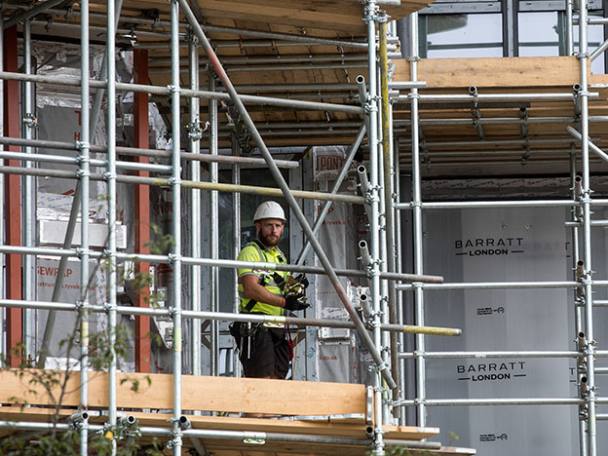- "Undemanding" offer could invite counteroffers
- FTSE 350 housebuilder margins don't correlate with scale
Last week, two UK housebuilding giants surprised the market after they revealed plans for a £2.5bn merger. Barratt Developments' (BDEV) takeover of Redrow (RDW) could capitalise on the eventual recovery in the UK housing market as interest rates fall and deliver an attractive return for shareholders.
Not everyone is bullish on the deal, though. Some question the ‘bigger is better’ mentality or whether the government’s competition watchdog will allow it.
Analysts have said that the 92,345 land holdings the resulting company would own is one of the key motivations behind the deal, but timing is also a factor in the land game. High interest rates have reduced buyer demand and slashed housebuilders' profits. As such, share prices have sunk to the point where many are now trading at a discount to their net asset value (NAV), usually a combination of land and cash holdings.
Land valuation on housebuilder balance sheets is historical, meaning an agent valued it at purchase years or decades ago. Given land values tend to track house values, some analysts believe the land many housebuilders own is worth more than what is on their balance sheets. The fact they are trading at a discount to that value represents a prime opportunity for merger and takeover offers. “There’s hidden value in the land banks,” Anthony Codling, an analyst at RBC Capital Markets, told Investors’ Chronicle.
This hunt for land at a bargain price might attract other buyers. Codling said the offer for Redrow was “undemanding” at 1.25 times book, noting that other housebuilder takeovers have happened at much higher equity multiples. He suggested that Taylor Wimpey (TW.), whose chief executive Jennie Daly used to work at Redrow, would be a “good fit” to swoop in and make a counter-offer, given its healthy balance sheet and similar size to Barratt.
There could also be other deals. “Private equity often looks at housebuilders at this point in the cycle,” said Codling, adding that they will judge their investment based on how much cash they could generate by building out a land bank. He cited Crest Nicholson (CRST) as a potential private equity target because of its discount to NAV.
However, the government’s competition watchdog might not look too kindly on more consolidation of undeveloped land. The Competition and Markets Authority is due to publish a paper on whether they control pricing through their land banks and other competition issues in the sector at the end of this month. It may question whether Barratt becoming an even bigger allows it to exert too much control over house prices. Barratt has previously said 'drip-feeding' new houses into towns to keep prices high was not part of its business strategy.
Several analysts believe the competition worries are overblown. Jefferies and RBC Capital Markets have analysed the land banks of Barratt and Redrow and argue there is limited ability for them to control pricing as the plots are in different locations spread across the country. Meanwhile, Aynsley Lammin, analyst at Investec, continues to see housebuilders as “price takers” not price makers, because of the liquid UK market for secondhand homes, thanks to Britons’ tendency to move more than Europeans.
‘Synergies’
Alongside land, the Barratt and Redrow boards cite £90mn in “synergies” as a key motivation for the deal, with cost savings created by combining resources, but there are also questions around this. A chunk of that will be a cost reduction from the sacking of 10 per cent of staff from the combined company, which could be between 800 and 850 jobs. Investors might wonder whether the merged company can maintain Redrow’s selling point as a brand that focuses on luxury with a staff cutback.
Meanwhile, some analysts argued that the supposed synergies would be hampered because there is a limit on how much economies of scale benefit housebuilders. “All housebuilding labour is local, as is a lot of material supply,” said IC writer Robin Hardy.
Lammin said that another risk of scaling up production is that the merged company becomes a “forced land buyer”, where it takes whatever plots it can find, at any price, to keep increasing output. However, he is less sceptical of the deal overall and noted that large housebuilders can always hand money back to shareholders if they feel they must slow down production. Berkeley (BKG) said it would do this last year, although shareholders might be sceptical about any move intentionally limiting growth.
The data shows housebuilders’ ability to scale effectively is mixed. Operating margins are higher for the FTSE 350 housebuilders than for the smaller players. But there is no correlation between size and efficiency among larger companies (see chart). Indeed, the smaller Redrow has a better margin than the larger Barratt. However, there are early signs Vistry (VTY) is making its acquisition of Countryside work, which could yet be a model for Barratt and Redrow.











